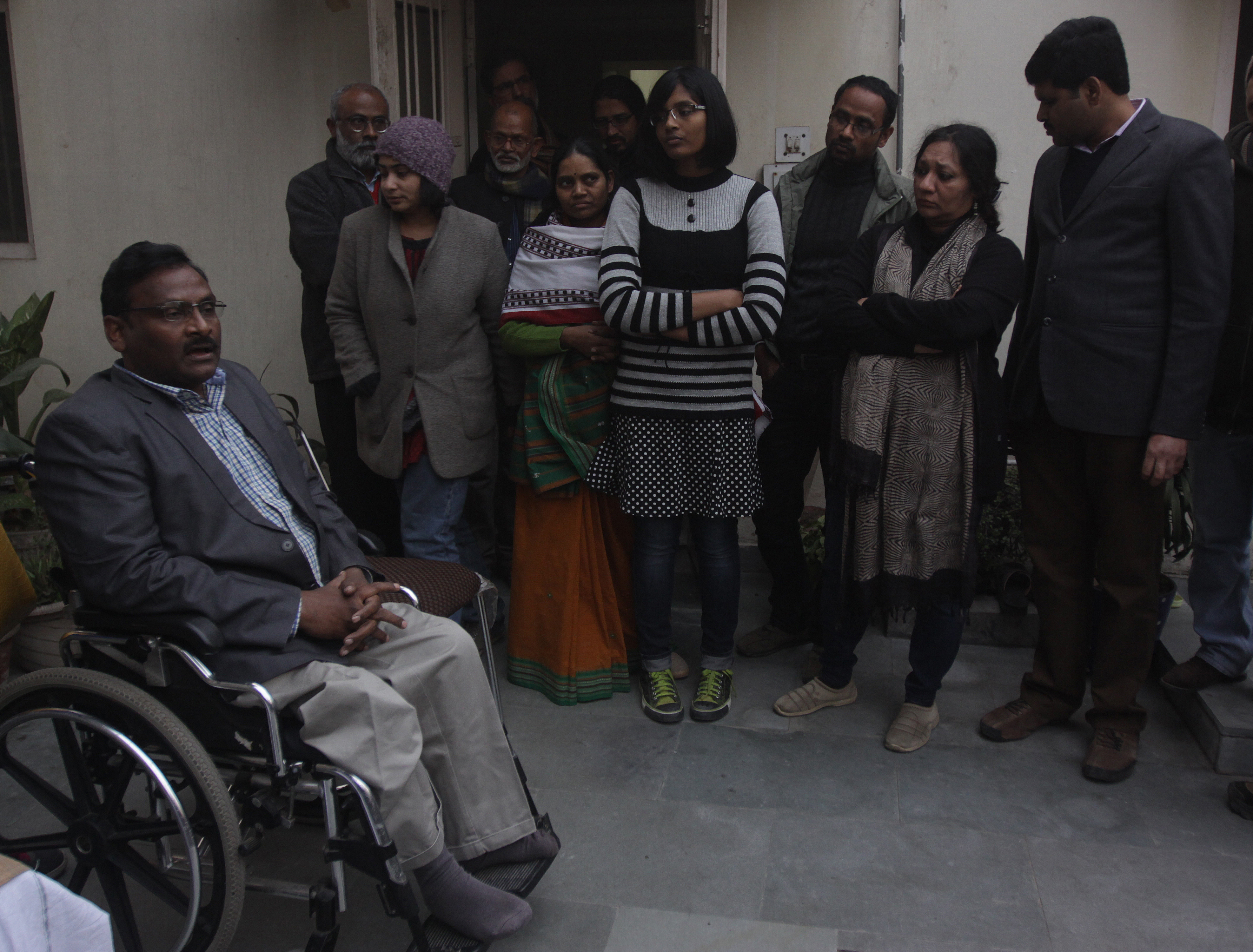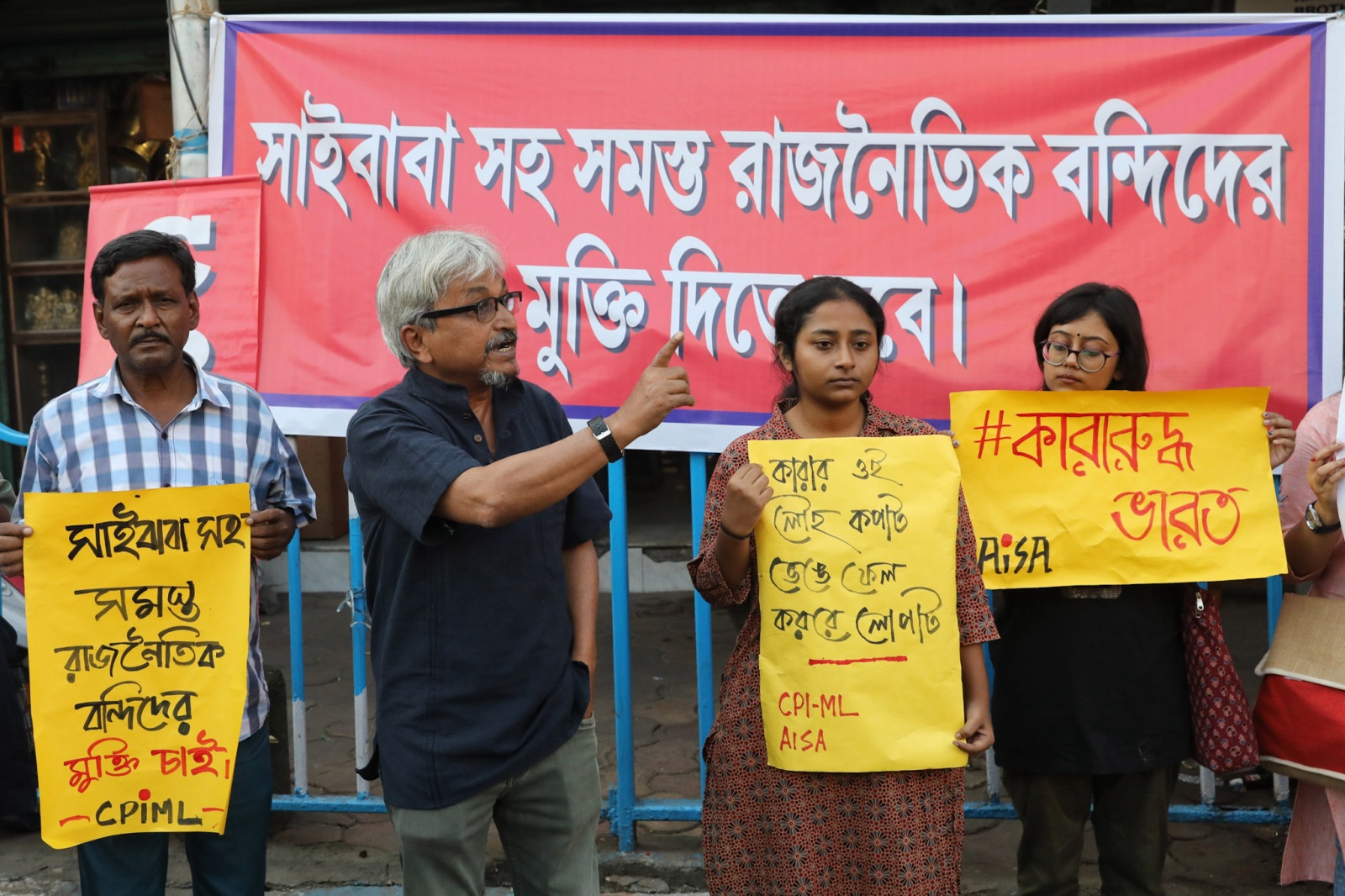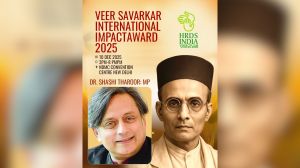Who is professor GN Saibaba?
G N Saibaba was an English professor at Delhi University’s Ram Lal Anand College which he had joined back in 2003. He had been suspended by the college in 2014 after being arrested by the Maharashtra police for suspected Maoist links.
 Ex-Delhi University professor GN Saibaba, (Express File Photo By Amit Mehra)
Ex-Delhi University professor GN Saibaba, (Express File Photo By Amit Mehra)Former Delhi University professor Dr G N Saibaba was acquitted by the Nagpur bench of the Bombay High Court on Tuesday in an alleged Maoist links case.
A division bench of Justices Vinay Joshi and Valmiki SA Menezes set aside the life imprisonment sentence imposed on him and also acquitted five others accused in the case.
The bench said it was acquitting all the accused as the prosecution failed to prove the case beyond reasonable doubt against them.
Who is G N Saibaba?
G N Saibaba was an English professor at Delhi University’s Ram Lal Anand College which he had joined back in 2003. He had been suspended by the college in 2014 after being arrested by the Maharashtra police for suspected Maoist links. Saibaba was lodged in the Nagpur Central Jail.
In March 2017, a Maharashtra sessions court convicted Saibaba and five others, including Mahesh Tirki, Pandu Narote, Hem Mishra, Prashant Rahi, and Vijay Tirki, for alleged Maoist ties and involvement in activities deemed as waging war against the nation.
 After the police raid at the residence of Delhi University professor GN Saibaba in New Delhi. (Express Photo By Amit Mehra)
After the police raid at the residence of Delhi University professor GN Saibaba in New Delhi. (Express Photo By Amit Mehra)
The court found them guilty under various provisions of the Unlawful Activities (Prevention) Act (UAPA) and the Indian Penal Code (IPC), sentencing Saibaba and five others to life imprisonment, while Vijay Tirki received rigorous imprisonment as a first-time offender.
According to the prosecution in the case, the documents listed under Saibaba’s name included letters to his daughter’s school headmaster and his college, along with communications under the pseudonym ‘Prakash’ addressing Maoist leaders in which he spoke about his handicap, his frustration in Delhi and his wish to work underground instead of managerial work.
 After the police raid at the residence of Delhi University professor GN Saibaba in New Delhi. (Express Photo By Amit Mehra).
After the police raid at the residence of Delhi University professor GN Saibaba in New Delhi. (Express Photo By Amit Mehra).
The judge said that it had been “established by the prosecution that all six accused belong to banned organisations CPI (Maoist) and Revolutionary Democratic Front (RDF), which is a Maoist front”.
“Several people had been killed and public property has been destroyed in the Maoist violence in Gadchiroli,” the judge said, adding that the Naxal movement was responsible for the violence.
Since his arrest, Saibaba’s family repeatedly sought bail, citing his deteriorating health due to physical disability. From June 2015 to December 2015, Saibaba was granted interim bail to receive medical treatment.
 Senior advocate Prashant Bhushan with CPI leader D. Raja, author-activist Arundhati Roy, former DUSU President Nandita Narain and others during a press conference demanding immediate release of Dr. GN Saibaba, in New Delhi, Wednesday, March, 10, 2021. (Express Photo by Tashi Tobgyal)
Senior advocate Prashant Bhushan with CPI leader D. Raja, author-activist Arundhati Roy, former DUSU President Nandita Narain and others during a press conference demanding immediate release of Dr. GN Saibaba, in New Delhi, Wednesday, March, 10, 2021. (Express Photo by Tashi Tobgyal)
According to his wife Vasantha, the wheelchair bound Saibaba suffers from “several life-threatening ailments”, including “Hypertrophic Cardiomyopathy with left ventricular dysfunction, hypertension, kidney stones, a cyst in his brain, pancreatic problems, attenuation of the shoulder and arm muscles, and nerves resulting in partial paralysis of his upper limbs”, and is 90% disabled.
In 2016, the Supreme Court had also directed the Maharashtra government to ensure proper amenities for Saibaba.
 Members of CPI(ML) liberation during a protest in Moulali, Kolkata demands release of Professor GN Saibaba and other political prisoners. (Express photo by Partha Paul)
Members of CPI(ML) liberation during a protest in Moulali, Kolkata demands release of Professor GN Saibaba and other political prisoners. (Express photo by Partha Paul)
The Bombay High Court acquitted Saibaba on October 14, 2022 citing procedural irregularities in his trial, a decision later challenged by the Maharashtra government in the Supreme Court.
The Supreme Court had on the same day suspended the Nagpur bench order stating that it is prima facie of the opinion that “a detailed scrutiny is required so far as the impugned judgment and order passed by the high court is concerned” and added that several important questions of law need to be considered.
Thereafter, in April 2023, the Supreme Court set aside the Bombay High Court order discharging Saibaba and others, and remanded the matter back to the high court to be decided afresh by a different bench.
Since his suspension in 2014, only half of his salary had been disbursed to his family. However, on March 31, 2021, the college principal signed a memorandum, terminating his services.
- 01
- 02
- 03
- 04
- 05































